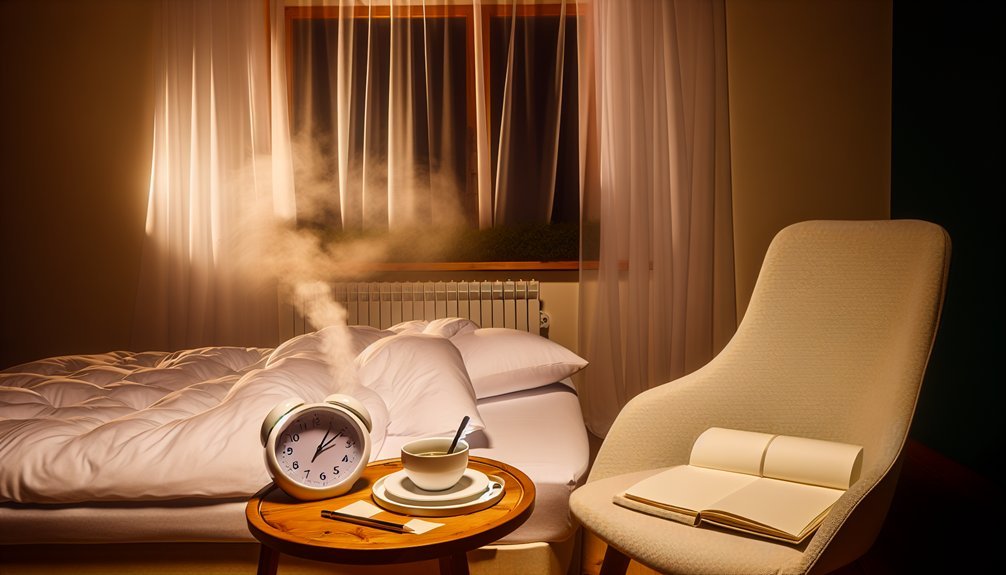To get better rest, start by sticking to a consistent sleep schedule. Create a relaxing bedtime routine with calming activities like gentle stretching or reading. Optimize your sleep environment by keeping it cool and clutter-free. Manage light exposure by installing light-blocking curtains and dimming lights in the evening. Limit caffeine and alcohol intake, especially close to bedtime. Staying active during the day and keeping stress in check also helps improve sleep quality. There's so much more to explore!
Key Takeaways
- Establish a consistent sleep schedule by going to bed and waking up at the same time each day, including weekends.
- Create a relaxing bedtime routine that includes calming activities like reading or gentle stretching, while avoiding screens an hour before sleep.
- Optimize your sleep environment by keeping the room cool, clutter-free, and personalized with soft furnishings and soothing scents.
- Manage light exposure by using light-blocking curtains at night and maximizing natural light during the day to support your sleep-wake cycle.
- Limit caffeine and alcohol intake, avoiding caffeine at least six hours before bedtime and alcohol three hours before sleep for improved rest.
Establish a Consistent Sleep Schedule

One of the easiest ways to improve your sleep is by establishing a consistent sleep schedule.
When you go to bed and wake up at the same time every day, you'll likely notice a boost in your overall sleep duration. This routine helps regulate your body's internal clock, making it easier to drift off at night.
By sticking to a consistent bedtime, you create a sense of freedom from the chaos of irregular sleep patterns. You'll feel more energized and focused during the day, allowing you to embrace life fully.
Create a Relaxing Bedtime Routine

Creating a relaxing bedtime routine is essential for winding down after a long day.
By establishing a consistent sleep schedule and incorporating relaxation techniques, you'll prepare your mind and body for sleep.
Don't forget to limit screen time before bed to help signal it's time to rest.
Establish Consistent Sleep Schedule
While a consistent sleep schedule is vital for quality rest, a relaxing bedtime routine can enhance the transition to sleep.
To establish effective bedtime habits, try incorporating these practices:
- Set a Fixed Time: Go to bed and wake up at the same time every day, even on weekends. This promotes sleep consistency and helps regulate your body's internal clock.
- Wind Down: Dedicate 30 minutes before bed to unwind. Engage in calming activities like reading or gentle stretching to signal your body it's time to sleep.
- Limit Screens: Avoid electronic devices an hour before bed. The blue light emitted can disrupt your natural sleep cycle, making it harder to achieve restful sleep.
Incorporate Relaxation Techniques
To ease your mind and body into sleep, incorporating relaxation techniques into your bedtime routine can make a significant difference.
Start with mindfulness meditation, focusing your thoughts on the present moment. This practice helps quiet the noise in your mind and allows stress to melt away.
Next, try progressive relaxation, where you systematically tense and then relax each muscle group, starting from your toes and working up to your head. This not only relieves physical tension but also promotes a sense of calm.
Combine these techniques with soft lighting, soothing scents, or gentle music to create a peaceful environment.
Limit Screen Time Before Bed
After integrating relaxation techniques into your routine, consider limiting screen time before bed to enhance your sleep quality.
Reducing your exposure to screens allows your mind to unwind and prepares you for a restful night. Here are three effective bedtime habits to adopt:
- Set a Screen Curfew: Aim to turn off devices at least an hour before sleep.
- Engage in Analog Activities: Replace screens with reading, journaling, or puzzles to stimulate your mind gently.
- Create a Calming Environment: Dim the lights and reduce noise to signal to your body that it's time to relax.
Optimize Your Sleep Environment

Creating a serene sleep environment is essential for achieving restful nights. Start by adjusting your sleep temperature; a cool room between 60-67°F promotes comfort and relaxation. You'll find it easier to drift off and stay asleep.
Next, focus on noise reduction. Consider using earplugs or a white noise machine to mask disruptive sounds that can interrupt your slumber. Soft furnishings, like curtains and rugs, can also help absorb noise, creating a peaceful atmosphere.
Keep your bedroom clutter-free and inviting, allowing your mind to unwind. Personal touches, like calming colors and soothing scents, can further enhance your space.
Manage Light Exposure

Since light plays a crucial role in regulating your sleep-wake cycle, managing exposure can significantly improve your sleep quality.
Here are some tips to help you harness the power of light:
- Use light blocking curtains: They keep your bedroom dark during the night, promoting deeper sleep and preventing disturbances from streetlights or early morning sun.
- Embrace natural light exposure: During the day, let in as much sunlight as possible. This helps signal to your body that it's time to be awake and alert.
- Dim the lights in the evening: Reduce artificial light exposure an hour before bed. Soft lighting helps your body produce melatonin, making it easier to drift off into a restful sleep.
Limit Caffeine and Alcohol Intake

Caffeine and alcohol can significantly affect your sleep quality, so timing matters when you consume them.
Try to limit caffeine intake in the afternoon and evening, and consider healthier alternatives like herbal tea.
Timing Matters
While enjoying a cup of coffee or a glass of wine may seem harmless, the timing of your consumption can significantly impact your sleep quality. Caffeine and alcohol can interfere with your circadian rhythms, reducing sleep duration and leaving you feeling groggy.
Here are three tips to consider:
- Limit caffeine: Try to avoid caffeine at least six hours before bedtime to give your body time to metabolize it.
- Watch your wine: Alcohol might help you relax, but it can disrupt your sleep cycle. Aim to finish drinking at least three hours before you hit the hay.
- Stay mindful: Pay attention to how different timings affect your sleep. Adjust accordingly for a more restful night.
Choose Alternatives
Instead of reaching for that late-afternoon coffee or evening glass of wine, consider healthier alternatives that won't disrupt your sleep.
Herbal teas, like chamomile or peppermint, can be soothing and promote relaxation.
You might also try sparkling water infused with fresh fruits for a refreshing option.
Stay Active During the Day

Staying active during the day can significantly improve your sleep quality at night. Engaging in physical exercise and outdoor activities helps regulate your body's internal clock and keeps energy levels balanced.
Here are three simple ways to stay active:
- Get Outside: Take a brisk walk or jog in a nearby park. Fresh air can do wonders for your mood and energy.
- Join a Class: Whether it's yoga, dance, or martial arts, try a class that excites you. Not only do you get fit, but you also meet like-minded people.
- Set Daily Goals: Aim for a specific number of steps or minutes of activity each day. Tracking your progress can motivate you to keep moving.
Keep Stress in Check

Managing stress is crucial for getting a good night's sleep, as high stress levels can keep you tossing and turning. To achieve that restful slumber, prioritize stress management techniques. Mindfulness practices, like meditation and deep breathing, can help you unwind and center your thoughts.
Here's a simple table to help you visualize effective stress management strategies:
| Mindfulness Practices | Benefits |
|---|---|
| Deep Breathing | Reduces anxiety |
| Guided Meditation | Enhances focus |
| Journaling | Clears your mind |
| Nature Walks | Boosts mood |
Conclusion
By incorporating these sleep hygiene tips into your daily routine, you're paving the way to a restful night, like planting seeds for a vibrant garden. Consistency, relaxation, and a healthy lifestyle can transform your sleep into a rejuvenating experience. Just remember, your body thrives on balance, so keep your environment cozy and your mind calm. Embrace these practices, and watch as your sleep quality blossoms, leading to brighter, more energized days ahead. Sweet dreams!




